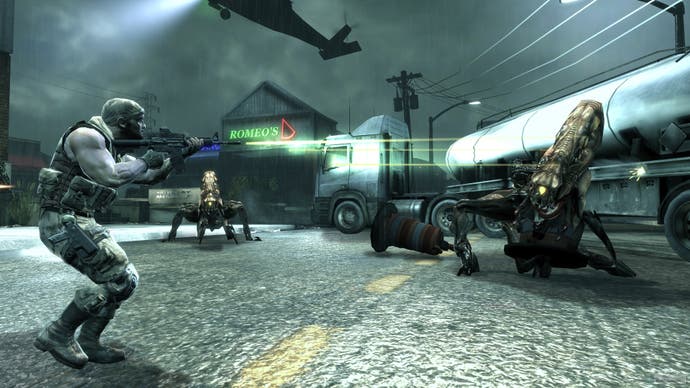Blacksite
Forget Area 51. They have.
Spot the difference. Gameplay: riding along in a chopper using a minigun to shoot at giant worms, hybrid human soldiers and an octopus monster on a bridge, and then running around in a squad with a tough-talking black guy and a cynical Middle-Eastern woman who tuts when the boys kick down doors. Description: an attempt to present a variety of perspectives on US foreign policy, the role of the military-industrial complex, the concept of special forces fighting an insurgency on American soil, and the belief that America "creates its own enemies", drawing on the lessons learned developing Deus Ex, with a writing team whose credits also include Thief 3 and BioShock.
Written down, it sounds like Predator 2 stumbling into Syriana. A journalist friend I bump into before interviewing Harvey Smith, creative director on Blacksite, jokes that his editor had told him to ask "why Harvey Smith is making a rubbish action game". Neither of us does, I don't think, but coming out of it the answer seems to be: because he reckons he can say what he wants to say and make a "pure shooter" at the same time. In fact, he seems utterly blasé about the juxtaposition.
The pure-shooter part is what you probably expect, especially if you've played the Xbox Live demo. What we're shown is an FPS game that enhances traditional run-and-gun gameplay by grafting on various elements: a one-button command control that directs your squad to take up cover positions, attack the enemy, plant explosives, kick down doors and go wherever you point and click; a squad-morale system that pumps the unit full of health and aggression when you take a strong lead, resulting in team-mates who race into the breach and melee-attack enemy soldiers if you've been directing them authoritatively and gunning down enemies, but who cower behind cover when you don't, blindfiring instead of engaging; and a destructible environment that lets you to shatter the enemy's cover with grenades, and shoot statues into 12 separate pieces.

These concepts together in concert overwhelm the perception of Blacksite as some sort of dumb shooter made by jobbing developers, or at least they try to. What's tricky about Blacksite is that, right now, what we've played is only formative on the baser level. There's a scenario where you fight waves of Iraqi soldiers while on tour outside Tikrit, capping them with sniper rifles, and then blasting them repeatedly with assault rifles. My tape of the presentation is a deafening chorus of machineguns punctuated by NPC smacktalk and Smith and his colleague Ricardo Bare shouting useful comments over the top. Another episode has you shooting at "octopus dog" aliens that will spit projectiles at you in the final build. The last is the chopper run, which climaxes with a shootout in the grounds of a radio base involving "javelin" rocket launchers (paint targets and then back off and fire round corners) and lots of circle-strafing.
But when you talk to Smith about it, the game takes a better shape. We talk about the squad-command stuff and he admits that a lot of people use it like a weapon. "We find that players do two things over and over once they learn the sort of vernacular of how to use the game: they send people further down the hall to see if it's safe, or down the street, and then if a fight kicks off they take up a more tactical location; and then once they get used to it they also send the squad to attack an enemy, and then they try and sneak around behind the enemy." But when I point out that it would be hard to empathise with your squad-mates if they're just tools for feeling the way, he counters: "what I learned from Deus Ex was that repeat exposure to characters and seeing them suffer is how you care about them". We then have an interesting discussion about your friends' backgrounds and how they play off against each other.


